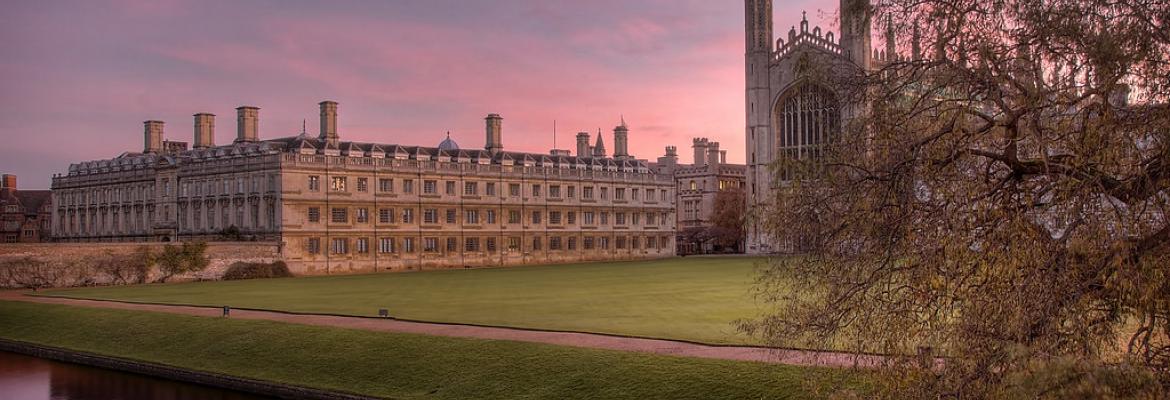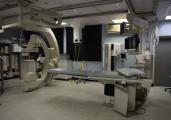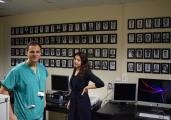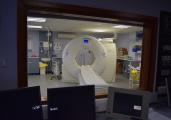Cambridge radiology training is based in Addenbrooke’s Hospital. The five-year training programme is based mainly in Cambridge except for a six-month period where time is spent in a DGH setting (three months at West Suffolk Hospital and three months at Luton) and another three months spent at Royal Papworth Hospital, a specialist cardiothoracic centre.
Core Radiology training runs between ST1 and ST3. Trainees rotate between three-monthly modules which cover all the major sub-specialities (e.g. musculoskeletal, gastrointestinal, breast, paediatrics). In the first year, six months is spent in the ultrasound department, learning skills to equip the trainee for on-calls.
Higher specialist training runs between ST4 and ST5, where subject to availability, trainees can choose which an area they would like to focus their time. This may include time spent at Royal Papworth Hospital. If Interventional Radiology is chosen a sixth year is spent in training.
There are several fellowships available to both internal and external candidates. These include a breast, interventional radiology and a neuro-interventional radiology. A cardiothoracic fellowship is available at Royal Papworth Hospital (which now shares our site).
Addenbrooke’s is a large teaching hospital with approximately 1,200 beds. It is a tertiary referral centre for a number of specialties including organ transplantation, neurosurgery and paediatrics. It is also the major trauma centre for the region. It was rated “Good” at its last CQC inspection.
Our radiology department consists of over 60 consultant radiologists and over 30 specialty registrars. We offer a full-range of sub-specialty interests including nuclear medicine, interventional radiology and neuro-interventional radiology. Addenbrooke’s is one of six academic health science centres in the United Kingdom, we have strong links with the Academic Department of Radiology and to the University of Cambridge. Academic Clinical Fellowships (ACFs) are available (specialty training posts that combine academic and clinical training).
Cambridge is a small city, approximately 50 miles north of London. It is famous for its university and growing quickly! There is a regular train service with journey times to London of less than one hour. Culture and the arts play a large part of the city’s heritage. There are several museums, theatres, music venues and art galleries.
The surrounding area of Cambridgeshire offers a wonderful range of things to see and do and includes several historic market towns (e.g. Bury St. Edmunds, Saffron Walden), riverside walks and several cathedrals. The Suffolk and Norfolk coast are easily accessible.
Owing to its low lying and easterly position, summer temperatures tend to be higher than other areas of the country and it also boasts one of the lowest rainfalls, perhaps why it is reported to be the city with the highest level of cycle use in the UK!
Trainees start on-call in ST2. There is a two-tiered rota with junior registrars (ST2-ST3) running the ultrasound service in the evenings and weekends and senior registrars (ST4-ST5) providing the majority of the out-of-hours CT reporting for the hospital. A senior registrar is always on-site overnight but there is always a consultant available for help if required.
On the whole, the training programmes is fairly traditional and a lot of learning occurs “on-the-job”. There are many radiologists in the department and there is lots of opportunity for one-to-one teaching. Each morning the ST1-ST3 trainees have consultant-led morning teaching which covers a range of different sub-specialities. There is also Wednesday afternoon teaching for this group of trainees which also covers the FRCR 2A syllabus. There is anatomy and physics teaching for the ST1s in preparation for the first part FRCR. We have run many successful teaching days on Professionalism and “non-technical skills”.
Cambridge Breast Unit provides a one year fellowship in breast imaging. The trainee will learn symptomatic and screening mammography and be a third (trainee) reader for the NHS Breast Screening Programme. The trainee will have extensive exposure and hands on training in breast and axillary ultrasound, breast and axilla biopsy, ultrasound vacuum biopsy, stereotactic vacuum biopsy, breast tomosynthesis, breast MRI and MRI guided biopsies.
There are two breast and one metastatic multidisciplinary team meetings (MDT) per week which the fellow participates in. There are many research opportunities often with new breast imaging techniques, for example Contrast Enhanced Spectral Mammography and microbubble imaging. Research and audit is often multidisciplinary and we publish in many peer review journals and present at national and international conferences.
For further information please contact Dr. Ruchi Sinnatamby ruchi.sinnatamby@addenbrookes.nhs.uk or Dr. Penny Moyle penelope.moyle@addenbrookes.nhs.uk at the Cambridge Breast Unit, Cambridge University Hospital NHS Trust.
The Department of Academic Radiology is a leading and internationally competitive department undertaking innovative research in medical imaging, bringing together multidisciplinary teams of academic radiologists and imaging scientists with clinicians and scientists working across the Biomedical Imaging Campus, Clinical School and the University of Cambridge. The department is recognized for its active doctoral and post-doctoral research programme and it has graduate opportunities each year for students pursuing PhD, MD and MPhil degrees. Like the PhD, the one-year MPhil in Radiology is entirely research-based and all students are part of a team run by an academic lead active in one or more of the Department’s current research themes. Clinical Academic Training opportunities are available through the Academic Clinical Fellowship (ACF) and Academic Clinical Lectureship (ACL) pathways.
The department is an integral part of the Cambridge Biomedical Campus, the largest biomedical cluster outside the US, and it has extensive collaborations with the NHS (through Addenbrooke’s, Rosie and Papworth Hospitals), research institutes within the Cambridge Biomedical Campus (Cancer Research UK Cambridge Institute, MRC Laboratory of Molecular Biology), University departments (Cavendish Laboratory, Department of Engineering, Department of Astronomy), pharmaceutical companies (AstraZeneca, GlaxoSmithKline) and imaging equipment manufacturers (GE, Siemens). Students and academic staff are supported through diverse funding initiatives by the NHS (National Institute for Health Research), University, local and national charities (Wellcome Trust, Cancer Research UK), Research Councils (Medical Research Council, Engineering and Physical Sciences Research Council) and Industry.
State-of-the art imaging facilities, including 3T and 1.5T MRI scanners, one PET-CT and several CT scanners are available for clinical and translational research. A new 7T MRI and a PET/MR scanner are currently being installed to investigate the structural, functional and metabolic changes in dementia and cancer. Cambridge has one of the world’s first clinical hyperpolarizers for carbon-13 MRI for real-time metabolic imaging in cancer and neurodegenerative diseases. Our work is supported by the cyclotron and radiochemistry facilities in the Wolfson Brain Imaging Centre, Addenbrooke’s Nuclear Medicine department and the newly refurbished radiopharmacy. The cyclotron and radiochemistry facilities produce a wide range of radiotracers giving us extensive opportunities for innovative research in clinical imaging.
The following academics are currently supervising students whose research falls into their specialist areas:
- Professor Fiona Gilbert (Breast Imaging, MRI, PET)
- Professor Evis Sala (Cancer Imaging, Genitourinary Imaging, MRI, PET/CT, PET/MR)
- Dr Ferdia Gallagher (Molecular Imaging, MRI, PET, Hyperpolarised MRI, Oncological Imaging, Hybrid Imaging)
- Dr Tomasz Matys (Brain Tumour, Multiple Sclerosis Imaging)
- Dr Tristan Barrett (Prostate cancer Imaging, Genito-urinary Radiology)
We welcome you to our website (http://radiology.medschl.cam.ac.uk/) and encourage you to contact us (camradiology@medschl.cam.ac.uk) if you are interested in undertaking training or researchh in Cambridge in medical imaging.
Training programme director, Justin Cross - justin.cross@addenbrookes.nhs.uk
Radiology admin SpR - radiologyheadhoncho@gmail.com




